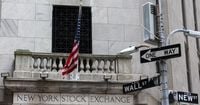On April 30, 2025, British bank Barclays reported a strong performance in its first-quarter earnings, with a pre-tax profit of £2.7 billion ($3.6 billion), marking an 11% increase year-on-year and exceeding analyst expectations of £2.49 billion. The bank's group revenues also saw a significant rise, reaching £7.7 billion, surpassing projections of £7.33 billion. This boost was largely attributed to a 16% increase in income from its investment banking division, which contributed £3.87 billion to the total.
Barclays' return on tangible equity, a key measure of profitability, reached 14% in the first quarter, up from an average of 7.5% in the previous quarter. Following the announcement, Barclays shares rose by 2% in early trading in London.
CEO C.S. Venkatakrishnan highlighted the bank's robust investment banking performance during an interview on CNBC's "Squawk Box Europe." He expressed concerns about ongoing market volatility, stating, "It's calmer now but I imagine it will continue to go up and down. Beyond that, as you've seen in our results, that market volatility helps us help clients manage their risk, we can do so in a profitable way that helps them as well and helps markets income, as long as you manage your risk well."
Venkatakrishnan also noted the potential for economic uncertainty affecting decision-making among companies and individuals, which could lead to a slowdown in economic activity. He emphasized the need for Barclays to be prepared for a range of scenarios, including potential economic weakness in key markets like the U.K. and the U.S.
In the first quarter, Barclays' U.S. consumer bank business reported a return on tangible equity of 9.1%, up from 4.1% in 2023. Income from this unit nudged 1% higher to £864 million, although profit before tax slipped 7% to £55 million. Meanwhile, the core U.K. consumer bank unit posted a 12% increase in income to £484 million and a 23% rise in pre-tax profit to £207 million, bolstered by the acquisition of Tesco Bank.
Despite the positive earnings report, Barclays has faced challenges due to the ongoing trade tensions initiated by U.S. President Donald Trump. The bank's shares took a significant hit when the trade war began on April 2, 2025, but have since recovered and are up more than 10% year-to-date. Analysts at RBC Capital Markets noted that while the pre-tax profit beat was driven by income, it was partially offset by higher-than-expected impairments.
As the economic landscape continues to shift, Britain may find itself in a unique position following its exit from the European Union. The EU recently faced 20% U.S. reciprocal tariffs, which were briefly suspended, while the U.K. only faces a 10% tariff. This situation could allow Britain to leverage its historical ties with the U.S. to secure a more favorable commercial arrangement.
In the broader market context, investors are increasingly looking to niche markets as a response to U.S. policy shocks and uncertainties affecting European growth. As reported on April 30, 2025, capital flight from Wall Street has led investors to explore emerging markets, including Latin American currencies and gold mining stocks. The euro's recent rise of 10% over two months has complicated the European equity landscape, halting a rally that had previously attracted U.S. capital.
Investor sentiment has shifted significantly since President Trump's "Liberation Day" announcement on April 2, which sent domestic stocks into a tailspin. Many are now favoring assets in emerging markets, with Mexican stocks rising nearly 14% in April alone. Pictet Asset Management, for example, has invested in Brazilian local currency debt and Australian and Canadian gold mining shares in response to these market dynamics.
In addition to the shifting focus of investors, gold prices reached a record $3,500 an ounce on April 22, 2025, further indicating a flight to safety amid ongoing volatility. Japan's yen gained over 4% against the dollar in April, while Germany's 10-year government bond yield fell to about 195 basis points below comparable U.S. Treasuries.
As Barclays navigates these turbulent waters, the bank's strong performance in investment banking positions it well to manage risks and capitalize on market opportunities. However, the uncertainty surrounding global trade and economic growth remains a pressing concern for the financial sector.
In summary, Barclays' first-quarter earnings reflect resilience amid a challenging economic environment, driven by solid performance in investment banking and strategic management of market risks. As the bank prepares for potential economic headwinds, its ability to adapt to changing market conditions will be crucial for sustaining growth and profitability in the future.




